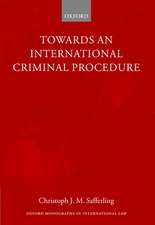An Ethics of Interrogation
Autor Michael Skerkeren Limba Engleză Paperback – 15 mai 2012
The act of interrogation, and the debate over its use, pervades our culture, whether through fictionalized depictions in movies and television or discussions of real-life interrogations on the news. But despite daily mentions of the practice in the media, there is a lack of informed commentary on its moral implications. Moving beyond the narrow focus on torture that has characterized most work on the subject, An Ethics of Interrogation is the first book to fully address this complex issue.
In this important new examination of a controversial subject, Michael Skerker confronts a host of philosophical and legal issues, from the right to privacy and the privilege against compelled self-incrimination to prisoner rights and the legal consequences of different modes of interrogation for both domestic criminal and foreign terror suspects. These topics raise serious questions about the morality of keeping secrets as well as the rights of suspected terrorists and insurgents. Thoughtful consideration of these subjects leads Skerker to specific policy recommendations for law enforcement, military, and intelligence professionals.
Preț: 288.59 lei
Nou
Puncte Express: 433
Preț estimativ în valută:
55.22€ • 57.92$ • 45.97£
55.22€ • 57.92$ • 45.97£
Carte tipărită la comandă
Livrare economică 01-15 aprilie
Preluare comenzi: 021 569.72.76
Specificații
ISBN-13: 9780226761626
ISBN-10: 0226761622
Pagini: 272
Dimensiuni: 152 x 229 x 23 mm
Greutate: 0.37 kg
Editura: University of Chicago Press
Colecția University of Chicago Press
ISBN-10: 0226761622
Pagini: 272
Dimensiuni: 152 x 229 x 23 mm
Greutate: 0.37 kg
Editura: University of Chicago Press
Colecția University of Chicago Press
Notă biografică
Michael Skerker is assistant professor in the Department of Leadership, Ethics, and Law at the US Naval Academy.
Cuprins
Acknowledgments
Introduction
Part I: Interrogation in Domestic Law Enforcement
One / Autonomy, Rights, and Coercion
Two / The Liberal State and Police Powers
Three / Plotting, Suspicion, and the Rights to Privacy and Silence
Four / The Privilege against Compelled Self-Incrimination
Five / Police Interrogation
Part II: Interrogation in International Contexts
Six / Prisoners of War and Other Martial Detainees
Seven / Noncoercive Interrogation
Eight / Coercive Interrogation
Conclusion
Notes
Index
Introduction
Part I: Interrogation in Domestic Law Enforcement
One / Autonomy, Rights, and Coercion
Two / The Liberal State and Police Powers
Three / Plotting, Suspicion, and the Rights to Privacy and Silence
Four / The Privilege against Compelled Self-Incrimination
Five / Police Interrogation
Part II: Interrogation in International Contexts
Six / Prisoners of War and Other Martial Detainees
Seven / Noncoercive Interrogation
Eight / Coercive Interrogation
Conclusion
Notes
Index









